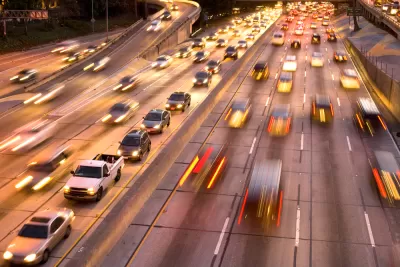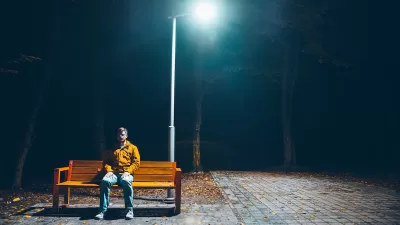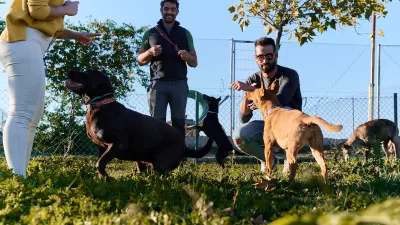Walkable neighborhoods, access to parks, and opportunities for social interaction can help reduce the burden of loneliness and promote community. But many of our cities aren’t built this way.

In an article in Streetsblog USA, Jennifer Kent, Emily J. Rugel and Marlee Bower, Emily J. Rugel, and Marlee Bower zoom out from the traditional view of loneliness as an individual problem to examine how urban design and the way we have built our cities contributes to a loss of social interaction.
The authors, who just completed a systematic review of research on loneliness and urban planning, identified factors that “can help people make connections,” including “housing design, transport systems and the distribution and design of open and natural spaces.”
The study found that living in small or poorly maintained housing can exacerbate loneliness by making people less likely to have friends over. “More universally, living in areas with good access to community centers and natural spaces helps people make social connections.” Additionally, access to public transit and active transportation options can also reduce loneliness and promote social interaction.
The authors also see a connection between socio-economic status and loneliness, largely because people with lower incomes tend to have less access to things like long-term housing they can personalize as their own, walkable neighborhoods, public parks, and other amenities that help reduce loneliness and improve mental health.
Ultimately, the authors conclude that context matters, and “there is no single built environment that is universally ‘good’ or ‘bad’ for loneliness.” But urban design and access to amenities can have a powerful influence on how people interact with others.
FULL STORY: Feeling Lonely? It's Not You, It's the Way We've Built our Nation

Maui's Vacation Rental Debate Turns Ugly
Verbal attacks, misinformation campaigns and fistfights plague a high-stakes debate to convert thousands of vacation rentals into long-term housing.

Planetizen Federal Action Tracker
A weekly monitor of how Trump’s orders and actions are impacting planners and planning in America.

In Urban Planning, AI Prompting Could be the New Design Thinking
Creativity has long been key to great urban design. What if we see AI as our new creative partner?

King County Supportive Housing Program Offers Hope for Unhoused Residents
The county is taking a ‘Housing First’ approach that prioritizes getting people into housing, then offering wraparound supportive services.

Researchers Use AI to Get Clearer Picture of US Housing
Analysts are using artificial intelligence to supercharge their research by allowing them to comb through data faster. Though these AI tools can be error prone, they save time and housing researchers are optimistic about the future.

Making Shared Micromobility More Inclusive
Cities and shared mobility system operators can do more to include people with disabilities in planning and operations, per a new report.
Urban Design for Planners 1: Software Tools
This six-course series explores essential urban design concepts using open source software and equips planners with the tools they need to participate fully in the urban design process.
Planning for Universal Design
Learn the tools for implementing Universal Design in planning regulations.
planning NEXT
Appalachian Highlands Housing Partners
Mpact (founded as Rail~Volution)
City of Camden Redevelopment Agency
City of Astoria
City of Portland
City of Laramie





























